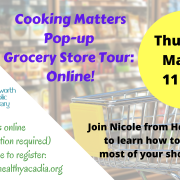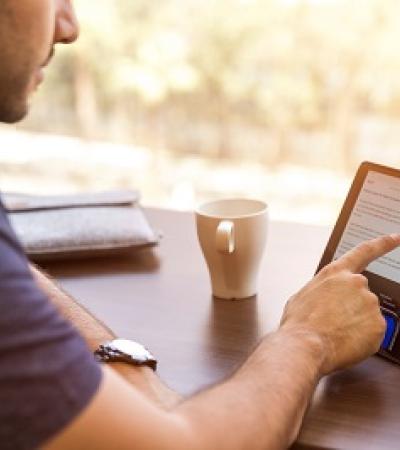Ellsworth Public Library and the local community health nonprofit Healthy Acadia partnered to present an online grocery store tour to share helpful tips about shopping healthy on a budget.
Nicole Gurerri, a Maine SNAP-Ed nutrition educator from Healthy Acadia, took participants on a virtual tour through a PowerPoint presentation, covering each food group and including tips for how to choose healthy options while saving money.
The presentation covered choosing seasonal options for fruits and vegetables, checking unit prices and creating a shopping list to plan ahead.
Advanced Planning
Following previous successful collaborations with Healthy Acadia, Nicole reached out to us about offering a grocery store tour program in January 2020. The program was originally intended to be held in person in late April. Nicole would lead the group and teach her curriculum, and I would work on publicity.
We had to put plans on hold due to the pandemic and decided to try it via Zoom in late May instead. We emailed back and forth a few times to discuss publicity and the program logistics.
Marketing
We promoted the event on Facebook and wrote a press release that was sent to the local newspaper, TV stations and radio stations. The Facebook event attracted some sign-ups, and then we were asked to do a Zoom interview on a local TV station, which helped spread the word.
Budgeting
This event was free for the library. Healthy Acadia provided $10 gift cards and booklets (mailed to participants after the event).
This was funded by Maine SNAP Ed. The USDA’s Supplemental Nutrition Assistance Program provides the funding for SNAP-Ed, which is administered by the Maine Department of Health and Human Services and implemented by the University of New England. Please see the "Advice" section below for more information about SNAP-Ed in your area.
If someone wanted to replicate this program without a budget, it would be possible to ask a local nutritionist to put together some slides about making healthy choices at the grocery store. The gift cards and booklets are a great addition, but not required for the program.
Day-of-event Activity
Nicole and I met in the Zoom meeting room a few minutes before the start of the program to discuss logistics, including how to take questions during the program. Using Zoom for the online platform worked really well for us. Nicole took registrations ahead of time and sent participants the link. We decided to mute everyone during the presentation and take questions in the chat throughout the presentation.
Nicole was great about incorporating questions along the way. She asked participants to write in the chat at the beginning of the program to tell us their names and why they had signed up for the program. This accomplished two goals — by learning why they signed up for the program, she was able to tailor the information to fit their interests, and it was also a good check to make sure that everyone knew how to access and use the chat.
One of the challenges of online programming can be lack of interaction, but there were good questions and contributions from the group in the chat, which was nice to see. The structure of the program made it feel very conversational. We anticipated that we might have some issues with our internet connections, but thankfully everything went smoothly.
Program Execution
We had 13 sign ups and 9 people attended. We were happy to be able to offer this program online to reach out to our patrons during this time without in-person programming. The online program attracted more people than the average number of sign-ups for this particular program when it has been held in person in the past.
We decided to record it for those people who were not able to attend at the time. Our goal was to connect people with information about healthy eating choices, and we were able to accomplish this via Zoom.
We received positive feedback about the program, especially because it’s a topic that is relevant during this time. We were able to pivot from a planned in-person program to an online program thanks to an established, strong partnership with Healthy Acadia and Nicole’s willingness to think outside the box.
Advice
Every state has a SNAP-Ed program. To connect with your state’s SNAP-Ed educators, search online for “SNAP-Ed + Your State” to find your local SNAP-Ed website and accompanying resources.
The library has also been sharing video demos and recipes from Healthy Acadia in our daily e-newsletter. This has been a great way to connect people with helpful resources during the pandemic while strengthening our partnership. I didn’t end up doing it this time, but in the past I’ve shared healthy recipes in the Facebook event discussion leading up to the day of the event to build excitement and keep people engaged.



